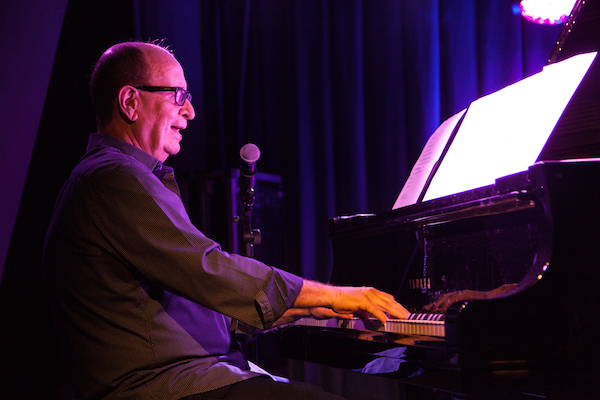Jan 13, 2026 2:09 PM
More Trump-Kennedy Center Cancellations
The fallout from the renaming of the John F. Kennedy Center for the Performing Arts to include President Donald…

Antonio Adolfo performs at The Blue Note in Rio de Janeiro, Brazil, on Nov. 11.
(Photo: Alexandre Moreira)For all its invigorating musical variety, encompassing everything from Malian blues to French jazz to surreal Serbian party-pop, the recent three-day MIMO music festival in Rio de Janeiro, Brazil, was lacking in one notable genre: samba jazz.
The place to get my samba jazz fix was the recently opened Blue Note-Rio, where pianist/composer Antonio Adolfo and his all-star septet held forth on Nov. 11. The spacious 300-seat club is the Blue Note organization’s eighth international location and its first in Latin America. Located in Rio’s Lagoa district, a wealthy lakefront neighborhood bordering Ipanema and Leblon in the shadow of the Christ the Redeemer statue, its programmers give equal time to American jazz stars like Chick Corea and Chris Botti, and Brazilian icons like João Donato and Sergio Mendes.
Although he may look more like a professor or kindly physician, Adolfo is, in reality, a killer pianist/arranger who combines a light touch with genuine, badass Brazilian swing. A creative force in Brazilian jazz since the 1960s (when at age 16 he first started working as a pianist and arranger with the bossa nova greats), he was recently nominated for a Grammy in the Best Latin Jazz Album category for his 2017 release Hybrido–From Rio To Wayne Shorter (AAM). (The album was the subject of a 4½-star review in the July issue of DownBeat.)
Adolfo’s band includes some of the most respected jazz musicians in Brazil: Jesse Sadoc (trumpet and flugelhorn), Serginho Trombone (whose name says it all), Marcelo Martins (tenor/soprano saxophones, flute) and the ace rhythm section of Lula Galvão (guitar), Jorge Helder (bass) and Márcio Bahia (drums). They played a seamless blend of samba and post-bop jazz that is simultaneously vintage and timeless.
The group’s opening statement, Benny Golson’s “Killer Joe,” presented a kind of template for the combination of hard-bop with samba. Following high-octane horn solos on Adolfo’s sinuous “Cascavel” (the name means “rattlesnake”), his piano solo displayed his penchant for percussive rhythm playing. His unique arrangement of “All The Things You Are” employed a few choice substitutions that added a haunting, bittersweet quality to a tune that might otherwise seem overly familiar.
He followed up with Horace Silver’s “Song For My Father.” It’s not much of a stretch to play the Latin-tinged standard as a samba; in fact, Silver was a frequent visitor to the jazz clubs of Copacabana. The arrangement, full of invention, charisma and jazz samba history, included a trombone solo by Serginho with lovely legato lines full of passion. Adolfo followed with a percussive solo reminiscent of Silver himself, at one point quoting Donato’s classic tune “Amazonas.”
The band performed three tunes from Adolfo’s powerful recent album Hybrido–From Rio To Wayne Shorter: “Prince Of Darkness,” “Footprints” and “Speak No Evil,” the latter featuring scintillating soloing by trumpeter Sadoc and saxophonist Martins. One wonders if Shorter has heard these versions; they sound, uncannily, as if Shorter had written them as sambas.
Midway through the show, Adolfo introduced a special guest: his old mentor and collaborator Carlos Lyra. Lyra, an elder statesman of bossa nova, still sings beautifully; he’s a bit like a Brazilian Charles Aznavour, and sang with the same magnetism and savior faire as the French balladeer. He performed a tender song he wrote back in the music’s heyday with the great poet and lyricist Vinicius de Moraes, “Sabe Você.” It was an “only in Rio” moment.
Adolfo and company closed with his instantly recognizable tune “Pretty World” (known in Brazil as “Sá Marina”), which was a worldwide hit for Sergio Mendes as well as being covered by Stevie Wonder. The tune prompted a Carioca friend to remark, “This music is so reminiscent of Rio in the 1960s.” It was the nostalgic sound of a sophisticated, romantic Rio that may exist more in people’s hearts than in the messy reality of modern Brazil.
To read a DownBeat article on the 2017 Grammy nominations, click here. To see a complete list of the nominations, visit the Grammy website. DB

Belá Fleck during an interview with Fredrika Whitfield on CNN.
Jan 13, 2026 2:09 PM
The fallout from the renaming of the John F. Kennedy Center for the Performing Arts to include President Donald…

Peplowski first came to prominence in legacy swing bands, including the final iteration of the Benny Goodman Orchestra, before beginning a solo career in the late 1980s.
Feb 3, 2026 12:10 AM
Ken Peplowski, a clarinetist and tenor saxophonist who straddled the worlds of traditional and modern jazz, died Feb. 2…

The success of Oregon’s first album, 1971’s Music Of Another Present Era, allowed Towner to establish a solo career.
Jan 19, 2026 5:02 PM
Ralph Towner, a guitarist and composer who blended multiple genres, including jazz — and throughout them all remained…

Rico’s Anti-Microbial Instrument Swab
Jan 19, 2026 2:48 PM
With this year’s NAMM Show right around the corner, we can look forward to plenty of new and innovative instruments…

Richie Beirach was particularly renowned for his approach to chromatic harmony, which he used to improvise reharmonizations of originals and standards.
Jan 27, 2026 11:19 AM
Richie Beirach, a pianist and composer who channeled a knowledge of modern classical music into his jazz practice,…